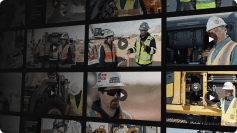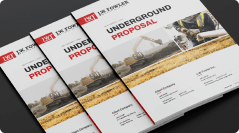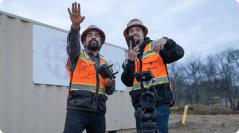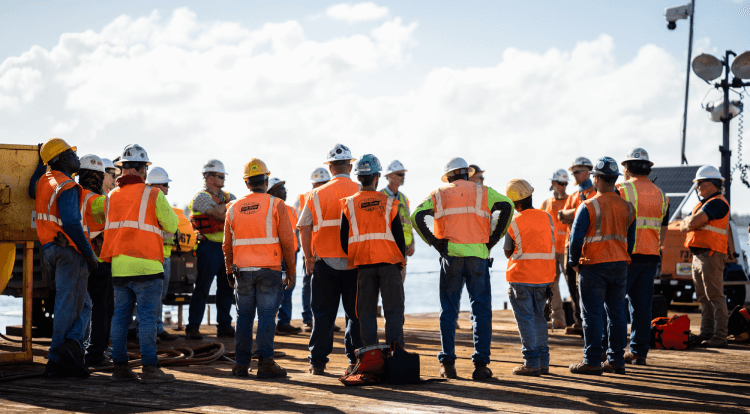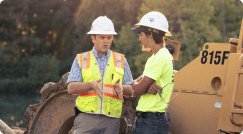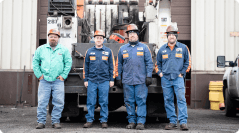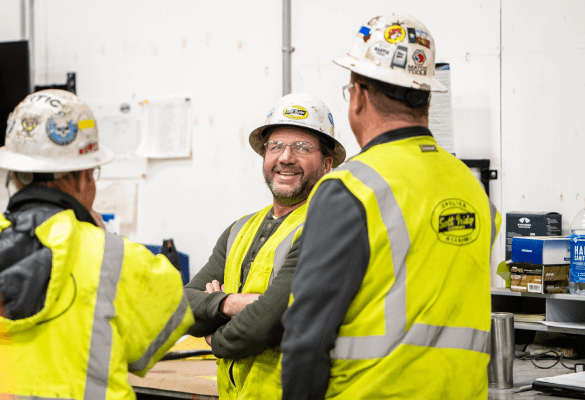Use CMAR
Sometimes in construction projects, people find unresolvable issues—even after the project ends.
According to Mike, you must root those things out and solve them ahead of time. The Construction Manager at Risk (CMAR) approach can help you do that.
Basically, the geotechnical engineer reviews the construction documents and predicts potential issues. They suggest ways for the project owner and contractor to avoid mistakes when construction starts. That saves you a ton of time and money down the road.
For example, let's say an engineer predicts soil compaction issues. When you iron out those potential issues with the CMAR approach before you compact the soil, you're more likely to pass geotechnical tests.
Conduct the right tests—and understand them
Geotechnical engineers use different tests in different areas. Mike's company is in Arizona, so they check soil compaction using either a nuclear density test or a sand cone test.
"Basically, they're just ways we can go to a jobsite, put a piece of equipment . . . on the ground and come up with a value as to what the in-place density and the moisture content are," Mike says.
Since several geotechnical firms may test your jobsites, it's important to understand common tests in your area so you can make sure their results line up.
Pay attention to accreditations
Some geotechnical engineering companies don't want to spend the money to get accredited or get extra certifications.
But as Randy says, "Likely there's somebody that is accredited, and that should give you a little bit more assurance that they're doing this right."
To get accredited, geotechnical firms have to meet certain federal, state, or local standards. Governing agents come to their labs to observe the firm's testing and inspect its quality systems manual, people, and equipment.
Geotechnical firms pay annual fees and go through regular inspections to maintain accreditation.
Maintain equipment
Geotechnical firms should calibrate their equipment regularly—usually every six months or yearly.
Some firms skip calibrations, because it's expensive or they don't want to send the equipment to an outside company for calibration.
Randy says, "Not all people are doing that maliciously. Construction and testing can be busy. It's like, 'Hey, the nuke gauge was supposed to be recalibrated a month ago, but it's summertime. We're working a lot of hours, and we can't really afford to lose it.'"
However, sometimes faulty test results are because of the wrong equipment or equipment that's not calibrated. Honest mistakes happen, but look for a geotechnical firm generally maintains its equipment.
Follow standard testing practices
Every geotechnical testing firm needs to follow the same procedures.
The Proficiency Sample Program (PSP) is a federal program that helps standardize testing processes. The government gathers soil samples and sends them to geotechnical testing labs across the country. Then, they ask all those labs to do the same test.
"We all submit our results back to the government, and they tell us how we're doing," Mike says. "If for some reason we have test data that doesn't marry up to everybody else's, we have to write a response and . . . investigate what might have gone wrong."
Mike tells contractors to ask for a geotechnical firm's PSP results if they're having issues with a particular test. It can help you find out if the firm is doing something wrong with the testing.
Randy agrees. However, he adds, "It's okay to challenge, but it needs to be done in the right way."
Don't come at your partner like a bully. Instead, approach them with the attitude that you want to talk about a potential issue and ask for their ideas.
For example, you might say something like, "Hey, Mike, we think something's off here. We've never had compaction issues in these soil types. Is it possible that we may have a procedure or calibration issue?"
By saying "we" instead of "you," you avoid blaming the geotechnical engineer. You show them that you're on their team, which is the foundation of a good relationship between contractors and geotechnical firms. You also open the door for both of you to share your experiences and expertise, so you can learn from each other.
Be willing to retest
It's important for contractors to ask—and geotechnical engineers to be willing—to redo tests if there are questions.
It could take a day or half a day to get answers, but it'll save you from wasting many more days down the road. It's worth it to spend an extra thousand dollars on the retest, even if you don't feel like you should have to.
"Contractors get so focused on costs that we step over the dollar to pick up the dime," Randy says.
Retesting can save you more money, because it helps you find problems while they're still easy to fix. (That's the dollar.) Skipping the retest is the dime. It sounds good now, but later, you could end up removing material that you already put in place because it won't compact properly.
"We can avoid issues by spending a little bit of time and money upfront on this particular project," Randy notes. "If you're placing millions of yards of dirt on an earthen embankment, it's almost certainly worth it."
So pick up the dollar and retest!
Align before the project starts
Mike's team and one of their regular project owners do a corrleation exercise about a month before the contractor starts placing fill.
Both the quality control (QC) and quality assurance (QA) firms bring three nuclear density gauges to the site and test with all of them. That's because you can have subtle differences from one gauge to the next, even if they're the same model.
"The idea is to basically do our own approval before the project starts," Mike says. That way they can pick the gauges that are most aligned to use on the project.
The exercise helps prevent work stoppages, because QA and QC align before the job starts. That also makes for a better working relationship: firms and contractors are more likely to get along if they get on the same page from day one!
Building a consistent team of people helps avoid human error, too. Randy says, "Sometimes, we even try and make sure we have the same technicians . . . so we know not only that the test equipment calibrates but that the people doing the tests calibrate."
When the project owner sees value in this alignment, they're often willing to help pay for some of this. But even if not, it's still worthwhile for the contractor to avoid potential problems and retesting.
Deal with testing disagreements wisely
If the geotechnical companies come up with different test results, you have to go back to the last time they agreed. That may be thousands of yards of dirt ago. That's not cheap to take out or put back.
Sometimes, even when you do everything right, you'll still run into some problems. For example, one testing company may delay giving their results to the other. That happened to Mike once, and it wasn't pretty:
"By the time we got [their report], we were finding issues with it, and we're stuck now with a project where . . . the other entity thought they passed while the work was going on. But upon further review . . . 20% of their field density tests are now failing tests. It's not unusual for one in 20 or one in 30 tests to fail, but 20% is a big number," he says.
At that point, you have to rework the test and get it to pass. And the engineer has to try to explain what happened and why the firms had different numbers.
Now, not every project will have QA and QC disagreements. But it's more likely with public works or large infrastructure, since you'll work with multiple geotechnical firms.
Mike recommends trying to limit conflict early. "Even in a market like Phoenix where there's 20 geotechnical firms, there are only so many to go around," he says. It's important to identify who's going to be doing QA, because then you won't ask them for a price to do QC. And vice versa.
Again, that's why having relationships between contractors and engineers is so important. You can call your partner to learn about the project and ask who's doing what, then look for a second geotechnical firm that will fit the team well.
Be open-minded
As a contractor, you need to know how open-minded the geotechnical firm and the project owner are—especially when it comes to testing issues.
Some firms and owners want an open, collaborative process. Other owners don't want the geotechnical firms talking to each other; they make the contractor figure out how to make the tests pass.
The second attitude can lead to slowdowns, decreased production rates, and extra costs to fix problems at the end of the project. As a contractor, it's important to know the firms' and owners' attitude, so you can help create unity.
According to Randy, you should have those conversations even if the owner doesn't want to. As you produce good results, the owner will hopefully see the value of geotechnical firms working well together. Then, they're more likely to get more involved.
Deal well with changes during the project
Anyone who's worked in the Dirt World for more than five minutes knows things change during a project.
"There was a project we were on, and they introduced a new nuke gauge eight months into it. When they did, it was clear that there were slight nuances, slight changes," Randy explains.
That could have led to a slowdown or even a work stoppage. But when you have a solid relationship with the geotechnical firm, it's easier to react quickly and find a good solution to deal with the changes.
Embrace the right attitude
Contractors need to partner with geotechnical firms that realize someone on their team could make a mistake. You don't want someone who's going to act like you're an idiot if you question their tests.
They also need to understand that mistakes are not the end of the world. The learning process is usually littered with mistakes; that's how you do it.
Make sure you align with a geotechnical partner who is willing to find better ways to do things, admit mistakes, and improve each day. And make sure you bring that same attitude to the table.
If you can do that, a lot of the other best practices we've talked about start to fall in line naturally.
← Contractors and Geotechnical Engineering
Common Geotech Questions from Contractors →


